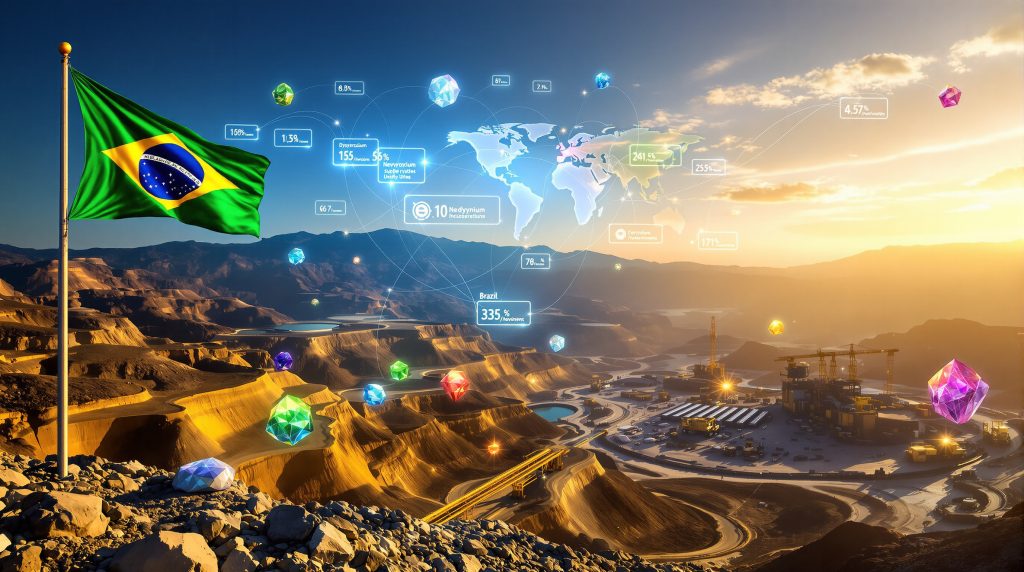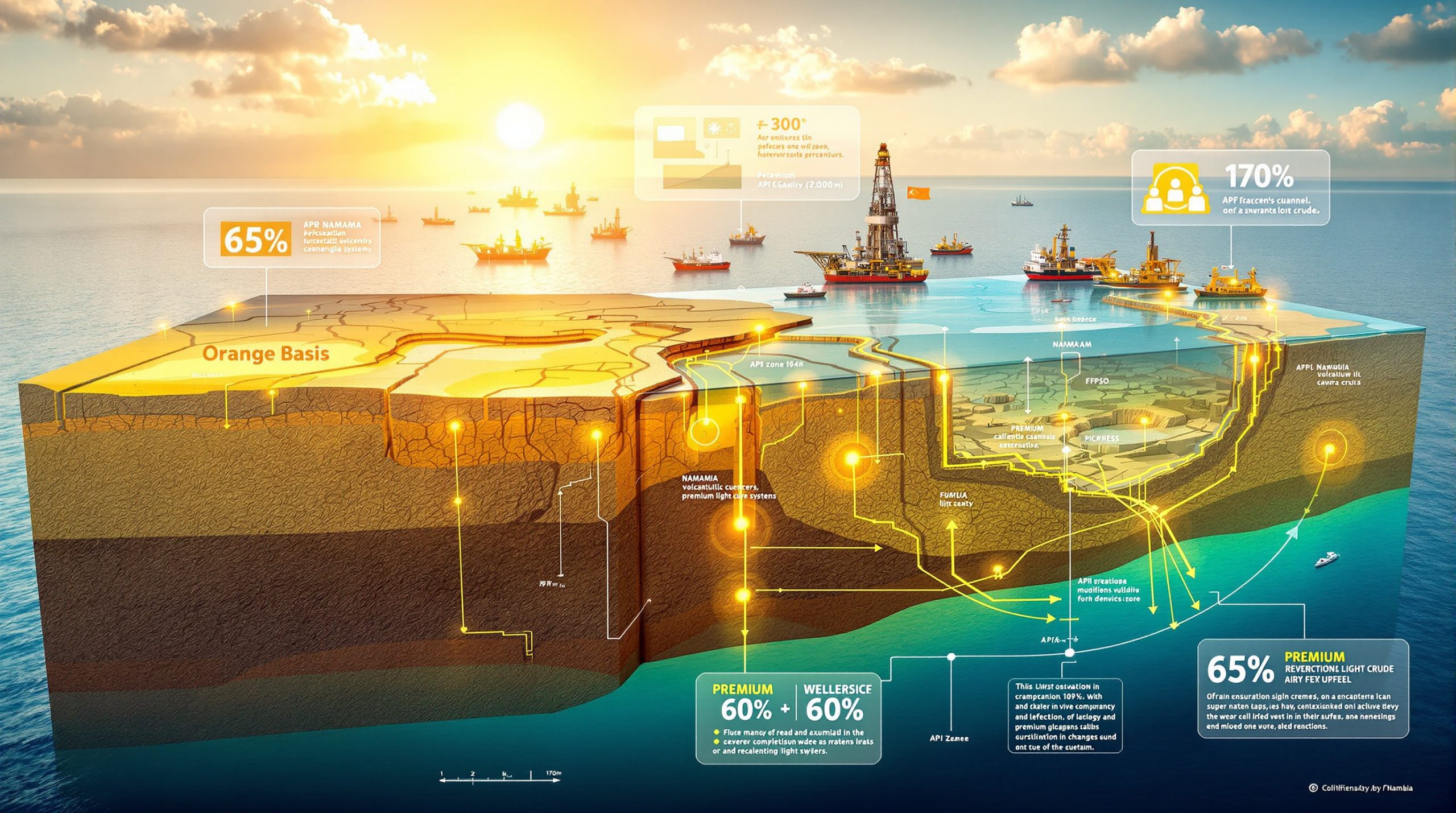Why Are US-Brazil Rare Earth Discussions Gaining Strategic Importance?
The convergence of critical minerals energy security concerns and evolving trade relationships has placed US official and Brazil rare earths meeting discussions at the center of hemispheric diplomatic strategy. As reported by Reuters on October 28, 2025, US Charge D'Affaires in Brazil Gabriel Escobar conducted strategic meetings with mining executives during an industry event in Salvador, Bahia, specifically focusing on rare earth mineral cooperation.
Global Supply Chain Vulnerabilities Drive New Partnerships
Current global rare earth supply chains exhibit dangerous concentration risks that threaten Western technological and defence capabilities. China maintains control over approximately 90% of global rare earth processing capacity, creating unprecedented dependency vulnerabilities for nations requiring these materials for advanced manufacturing sectors.
The strategic importance becomes clear when examining specific applications:
• Military defence systems requiring neodymium for precision-guided munitions
• Electric vehicle manufacturing dependent on dysprosium for permanent magnets
• Wind turbine generators utilising terbium for high-efficiency operations
• Advanced electronics incorporating yttrium for display technologies
Brazil's documented reserves of 21 million tons of rare earth elements represent the world's second-largest known deposits, positioned strategically outside Asian geopolitical influence zones. This geological advantage provides the United States with potential alternative sourcing arrangements that could fundamentally restructure global supply chain dependencies.
Trade Relations Context Shapes Mineral Negotiations
The timing of these rare earth discussions coincides with broader trade policy considerations between Washington and Brasília. Current 50% US tariffs on Brazilian goods create significant negotiation leverage points that both governments recognise as interconnected with critical mineral access agreements.
According to Reuters reporting from October 28, 2025, rare earth topics are specifically expected to feature prominently in upcoming negotiations aimed at removing these trade barriers. This linkage demonstrates how critical minerals have evolved beyond simple commodity transactions into complex geopolitical bargaining instruments.
Recent diplomatic reengagement efforts between Presidents Trump and Lula have established frameworks for addressing these interconnected economic challenges through structured bilateral cooperation mechanisms. Furthermore, the geopolitical mining landscape continues to evolve as nations seek to reduce dependencies on single-source suppliers.
What Makes Brazil's Rare Earth Resources Particularly Valuable?
Production Milestones and Geographic Advantages
Brazil has achieved remarkable technological milestones in rare earth processing that distinguish its capabilities from other non-Chinese producers. The country became the first non-Asian nation to commercially produce four distinct rare earth metals, demonstrating advanced processing competencies previously concentrated in East Asian facilities.
The Minazu facility represents Brazil's emerging rare earth processing infrastructure, showcasing domestic capabilities for value-added mineral processing rather than simple raw material extraction. This facility demonstrates operational proficiency in:
| Processing Stage | Technical Capability | Market Significance |
|---|---|---|
| Ore concentration | Advanced flotation systems | Reduced shipping costs |
| Chemical separation | Solvent extraction technology | Higher purity outputs |
| Metal production | Electrolytic reduction processes | Finished product manufacturing |
| Quality control | Spectrographic analysis | International standards compliance |
Strategic geographic positioning outside China's sphere of influence provides additional security advantages for Western supply chain planners. Brazilian facilities operate under stable democratic governance structures with established legal frameworks protecting foreign investment partnerships.
Regulatory Environment Favouring International Investment
Brazilian regulatory structures actively encourage foreign participation in rare earth development projects through progressive mining legislation. Unlike many resource-rich nations that restrict foreign ownership, Brazilian laws explicitly permit international companies to participate directly in rare earth extraction and processing ventures.
The National Mining Policy Council activation represents systematic government commitment to modernising strategic mineral policies. This council addresses regulatory bottlenecks that previously hindered rapid development of critical mineral projects through streamlined permitting processes.
Government support extends beyond regulatory facilitation into active promotion of supply chain development initiatives. These programmes include:
• Tax incentives for rare earth processing facility construction
• Research partnerships between Brazilian universities and international corporations
• Infrastructure development supporting mining region connectivity
• Environmental compliance assistance for sustainable extraction practices
How Do Current Market Dynamics Influence US-Brazil Cooperation?
Critical Mineral Supply Security Concerns
Market dynamics surrounding rare earth elements reveal fundamental structural imbalances that create both risks and opportunities for US-Brazil cooperation. Chinese processing dominance creates single-point-of-failure vulnerabilities that concern defence and technology sector planners responsible for long-term supply security.
| Challenge | US Impact | Brazil Opportunity |
|---|---|---|
| Chinese processing dominance | Supply vulnerability during geopolitical tensions | Alternative processing hub development |
| Trade war restrictions | Limited access to Chinese REE during disputes | New partnership potential with stable democracy |
| Defence sector requirements | Strategic mineral needs for military applications | Export market expansion into high-value sectors |
| Technology manufacturing | Semiconductor and electronics supply risks | Value-added processing capabilities |
Current trade war dynamics between Washington and Beijing create additional urgency around alternative sourcing arrangements. When diplomatic tensions escalate, rare earth supply chains face immediate disruption risks that threaten critical manufacturing operations across multiple industrial sectors.
Additionally, the Trump critical minerals order has emphasised the strategic importance of securing alternative supply chains. In contrast, the Australia critical minerals reserve demonstrates how allied nations are developing their own strategic approaches to mineral security.
Infrastructure Development Requirements
Brazil's rare earth sector faces significant infrastructure development requirements that create natural partnership opportunities with US companies possessing advanced extraction and processing technologies. Current domestic capabilities lack the technological sophistication required for efficient large-scale rare earth separation processes.
US investment could accelerate domestic processing capabilities through technology transfer agreements that benefit both nations. American companies gain access to high-grade ore deposits while Brazilian partners acquire advanced processing knowledge previously available only through Asian suppliers.
Joint venture structures may address technological gaps more efficiently than independent development approaches. These partnerships enable:
• Rapid scaling of processing capacity through proven technologies
• Risk sharing between experienced operators and resource owners
• Market access combining Brazilian minerals with US distribution networks
• Innovation development through collaborative research and development programmes
What Are the Key Outcomes Expected from These Diplomatic Meetings?
Bilateral Cooperation Framework Development
The strategic meetings between US officials and Brazilian mining executives aim to establish comprehensive bilateral cooperation frameworks extending beyond immediate commercial transactions. Enhanced energy and critical minerals partnerships represent foundational elements of longer-term hemispheric resource security strategies.
Technology transfer agreements for processing facilities constitute essential components of these frameworks. Such agreements enable Brazilian companies to acquire advanced separation and purification technologies while providing US partners with reliable ore supply arrangements secured through long-term contracts.
Joint research initiatives focusing on sustainable extraction methods address growing environmental concerns while advancing technical capabilities. These collaborative programmes target:
• Environmental impact reduction through improved processing efficiency
• Waste minimisation via advanced recycling technologies
• Energy consumption optimisation for cost-effective operations
• Water usage reduction through closed-loop processing systems
Trade Barrier Resolution Mechanisms
Structured approaches to resolving current trade tensions recognise the interconnected nature of tariff policies and critical mineral access arrangements. Potential tariff reductions tied to mineral access agreements create mutually beneficial negotiation frameworks addressing both economic and security concerns.
The October 28, 2025 Reuters report specifically notes expectations that rare earth topics will feature prominently in negotiations aimed at removing existing trade barriers. This integration demonstrates sophisticated understanding of how critical minerals function as strategic assets beyond simple commercial commodities.
Long-term economic cooperation extends beyond immediate trade issue resolution into comprehensive partnership development. These broader agreements establish frameworks for sustained collaboration across multiple economic sectors whilst addressing political friction impacts through structured diplomatic mechanisms.
Moreover, the establishment of a critical raw materials facility approach, similar to European models, could provide a blueprint for Western Hemisphere cooperation structures.
How Does This Partnership Fit Within Global Critical Minerals Competition?
Strategic Positioning Against Chinese Market Control
Brazil's rare earth development represents a fundamental shift in global supply chain dynamics, offering the United States a viable pathway to reduce dependency on Chinese-controlled resources whilst providing Brazil with technological advancement opportunities through international partnerships.
Key Strategic Insight: The emergence of Brazilian rare earth capabilities outside Chinese influence zones creates the first credible alternative processing hub in the Western Hemisphere, fundamentally altering global supply chain risk calculations for defence and technology sectors.
This positioning enables Western nations to develop redundant supply chains that maintain operational continuity during geopolitical disruptions. Brazilian facilities operating under democratic governance structures provide supply security guarantees unavailable through politically volatile regions.
Furthermore, Brazil's rare earths are likely to become a significant bargaining chip in future trade negotiations between the two nations.
Regional Influence and Supply Chain Diversification
Latin American critical minerals are gaining unprecedented geopolitical importance as resource competition intensifies between major powers. Brazil's rare earth development catalyses broader regional resource cooperation initiatives that strengthen hemispheric supply chain integration.
Alternative supply routes reduce single-point-of-failure risks that currently threaten Western manufacturing capabilities. Geographic diversification across multiple continents creates operational flexibility enabling continued production during regional disruptions or transportation network interruptions.
Enhanced Western Hemisphere resource cooperation potential extends beyond bilateral US-Brazil arrangements into multilateral frameworks involving Canada, Mexico, and other regional partners. These broader cooperation structures develop comprehensive North and South American critical mineral networks independent of Asian supply dependencies.
What Challenges Could Impact US-Brazil Rare Earth Collaboration?
Technical and Infrastructure Barriers
Significant technical challenges constrain rapid development of Brazilian rare earth processing capabilities despite abundant ore deposits and supportive regulatory environments. Limited domestic processing expertise requires substantial technology transfer investments and extended training programmes for local technical personnel.
Capital-intensive facility development requirements present additional barriers to rapid scaling. Modern rare earth separation facilities require:
• Specialised chemical processing equipment costing hundreds of millions of dollars
• Advanced environmental control systems meeting international emissions standards
• Highly trained technical personnel with specific rare earth processing expertise
• Reliable power infrastructure supporting energy-intensive separation processes
Environmental compliance and sustainability standards add complexity to facility development timelines. Brazilian environmental regulations require comprehensive impact assessments and mitigation plans that extend project development schedules whilst ensuring responsible resource extraction practices.
Political and Economic Considerations
Maintaining cooperation continuity across political transitions presents ongoing challenges for long-term partnership stability. Democratic electoral cycles in both countries create policy uncertainty that may affect sustained collaboration commitments through changing administrations.
Balancing foreign investment benefits with national resource sovereignty concerns requires careful negotiation of partnership structures. Brazilian stakeholders must ensure international collaboration enhances rather than compromises domestic control over strategic mineral resources.
Managing competing international partnerships and agreements adds diplomatic complexity as multiple nations seek Brazilian rare earth access. China, European Union members, and other partners actively compete for preferred supplier relationships that may conflict with exclusive US arrangements.
What Does This Mean for Global Rare Earth Markets?
Supply Diversification Impact on Pricing
Brazilian rare earth development introduces significant supply diversification that could fundamentally alter global pricing dynamics currently dominated by Chinese producers. Potential reduction in Chinese pricing power emerges as alternative suppliers achieve commercial-scale production capabilities.
Increased competition in processing and refining sectors benefits downstream manufacturers through more favourable pricing arrangements and reduced supply risk premiums. Multiple supplier relationships enable purchasing strategies that optimise costs whilst maintaining supply security through diversified sourcing portfolios.
Market stability improvements through multiple supplier relationships reduce volatility associated with single-source dependencies. Price stability benefits extend throughout supply chains supporting electronics, renewable energy, and defence manufacturing sectors requiring predictable input costs for long-term project planning.
Investment and Development Opportunities
US companies gain unprecedented access to high-quality Brazilian mineral assets through partnership arrangements that were previously unavailable due to geographic and political barriers. These opportunities enable vertical integration strategies that control supply chains from extraction through finished product manufacturing.
Technology sector companies benefit from supply security improvements that reduce operational risks associated with critical component availability. Reliable rare earth access enables aggressive expansion plans and innovative product development programmes requiring stable material inputs.
Defence contractors secure alternative material sources essential for maintaining national security manufacturing capabilities independent of potentially adversarial suppliers. These arrangements ensure continued production of advanced military systems regardless of international political developments affecting traditional supply relationships.
The convergence of Brazilian resource capabilities with US technological expertise and market access creates unprecedented opportunities for comprehensive rare earth supply chain development. As reported in the October 28, 2025 Reuters coverage of the US official and Brazil rare earths meeting, these strategic discussions represent foundational steps toward hemispheric resource security that could reshape global critical mineral markets for decades to come.
Could Your Next Investment Opportunity Emerge from Strategic Mineral Discoveries?
The US official and Brazil rare earths meeting highlights how critical mineral developments are reshaping global markets and creating new investment landscapes for astute investors. Discovery Alert's proprietary Discovery IQ model delivers instant notifications on significant ASX mineral discoveries, enabling subscribers to identify actionable opportunities as strategic mineral partnerships unfold and influence market sentiment across related sectors.




